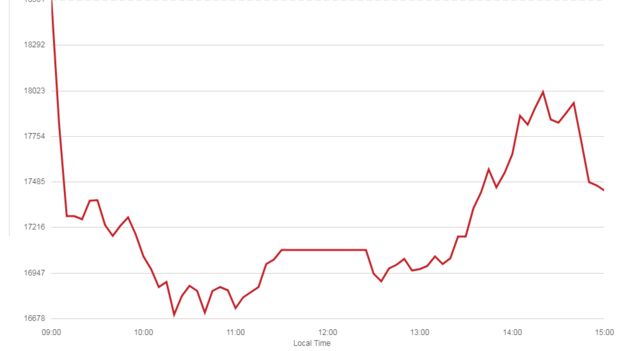European stock indexes are recovering some ground after huge falls on Thursday.
Markets have seen volatile trading as investors weigh the effect of the coronavirus against measures aimed at easing its economic impact.
Share markets across the Asia-Pacific region, including Japan, Australia and India, have experienced major swings.
It came after the Dow and S&P 500 in the US saw their biggest one-day declines since 1987.
In recent days authorities around the world have announced emergency measures in an attempt to avoid recession.
On Friday, the UK’s Financial Conduct Authority (FCA) prohibited short selling of a raft of shares in Italian and Spanish firms, after a request from authorities in those countries for the action, which is designed to protect that list of companies.
The prohibition came after major falls in Italian and Spanish indexes on Thursday.
Short selling is speculation that the price of a stock will go down, and if there are more short sellers than buyers, the price will be pushed down.
Firms including football clubs Lazio and Juventus were on the list, as well as luxury car manufacturer Ferrari.
Market bounce
Stock market volatility has been very high, with investors deeply concerned about the economic effects of coronavirus.
In early trading on Friday, the London markets rose more than 3%, and Spain’s Ibex 35 rose more than 6%.
The FTSE MIB, the benchmark index for Milan’s Borsa Italiana, climbed more than 3% after a 16% fall on Thursday.
The European markets followed Asian exchanges in ticking up.
Japan’s Nikkei 225 index was down by more than 10% in early trading before regaining some ground to end about 6% lower.
Australia’s benchmark ASX 200 saw its biggest trading swing on record as it reversed a loss of 8.1% to end the day 4.4% higher.
Trading in India’s Nifty 50 stock index was halted for 45 minutes on Friday morning after it fell 10% and hit a “circuit-breaker” and bounced back into positive territory once trading resumed.
The Hang Seng in Hong Kong closed down more than 1%, and China’s Shanghai Composite was 1.2% lower, both off their session lows.

“There is a sense of fear and panic,” said James Tao, an analyst at stockbroker Commsec in Sydney.”It’s one of those situations where there is so much uncertainty that no-one quite knows how to respond… if it’s fight or flight, many people are choosing flight at the moment,” he added.
- Coronavirus ‘could cost millions of tourism jobs’
- Norwegian to suspend half its staff as virus spreads
- Eurozone tries to ease coronavirus crisis
Friday’s moves follow steep losses in the US and Europe on Thursday, which gathered pace after US President Donald Trump spooked investors when he restricted travel from Europe, and the European Central Bank (ECB) disappointed markets by holding back on rate cuts.
Benchmark indexes on Wall Street and in the City of London saw their steepest daily falls since so-called Black Monday in 1987. In France and Germany, indexes lost more than 12%.
Those declines came despite actions by the Federal Reserve and ECB to support the market.
Losses on European indexes accelerated after the eurozone’s central bank failed to cut interest rates, although it did pledge fresh stimulus measures.
The New York branch of the Federal Reserve said it was pumping $1.5 trillion to ease strains in the debt markets, offering increased overnight loans to banks and expanding the kinds of assets it will buy to keep firms lending.
The announcement, which came after European markets had closed, briefly sent shares higher, but they dropped back by the end of the day. Last week the US central bank cut rates, followed on Wednesday by the Bank of England.

Why should I care if stock markets fall?
Many people’s initial reaction to “the markets” is that they are not directly affected, because they do not invest money.
Yet there are millions of people with a pension – either private or through work – who will see their savings (in what is known as a defined contribution pension) invested by pension schemes. The value of their savings pot is influenced by the performance of these investments.
So big rises or falls can affect your pension, but the advice is to remember that pension savings, like any investments, are usually a long-term bet.
BBC